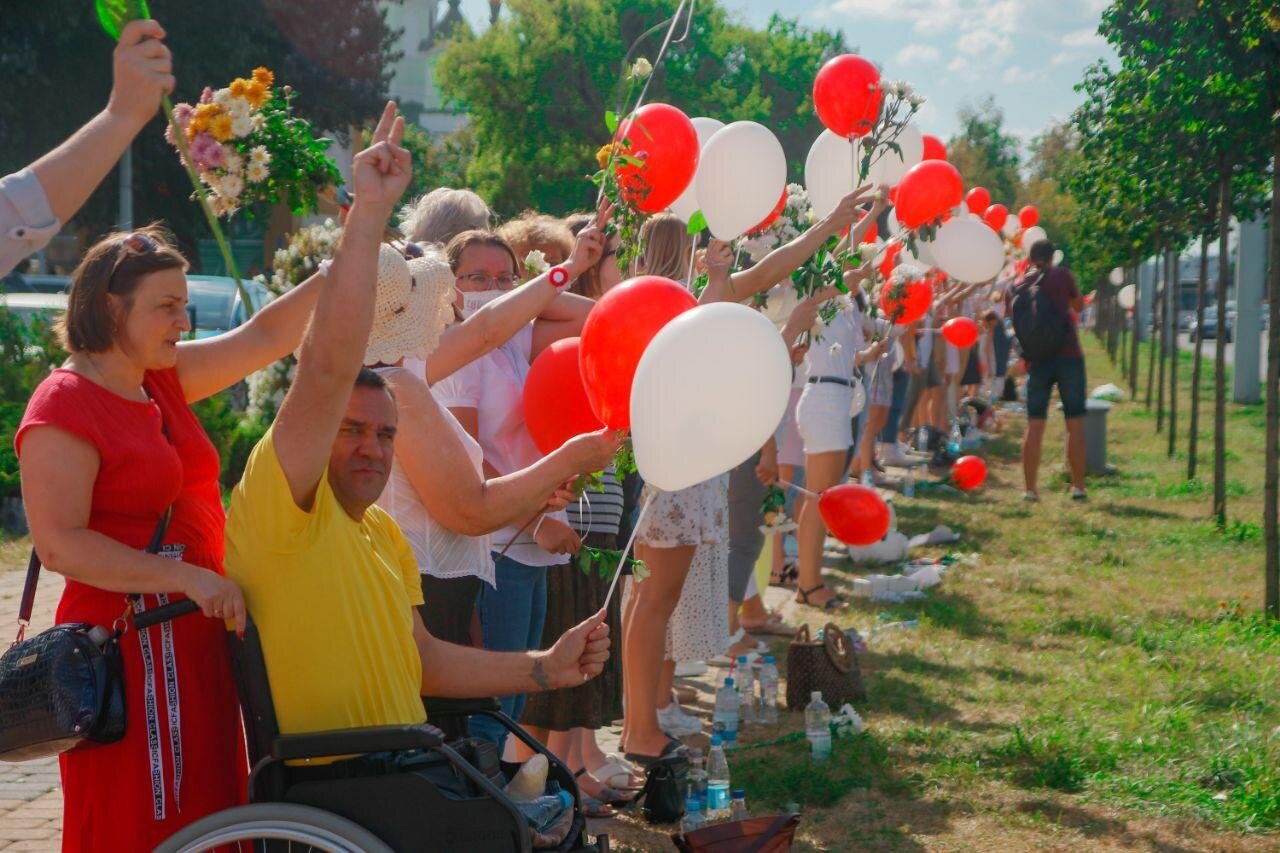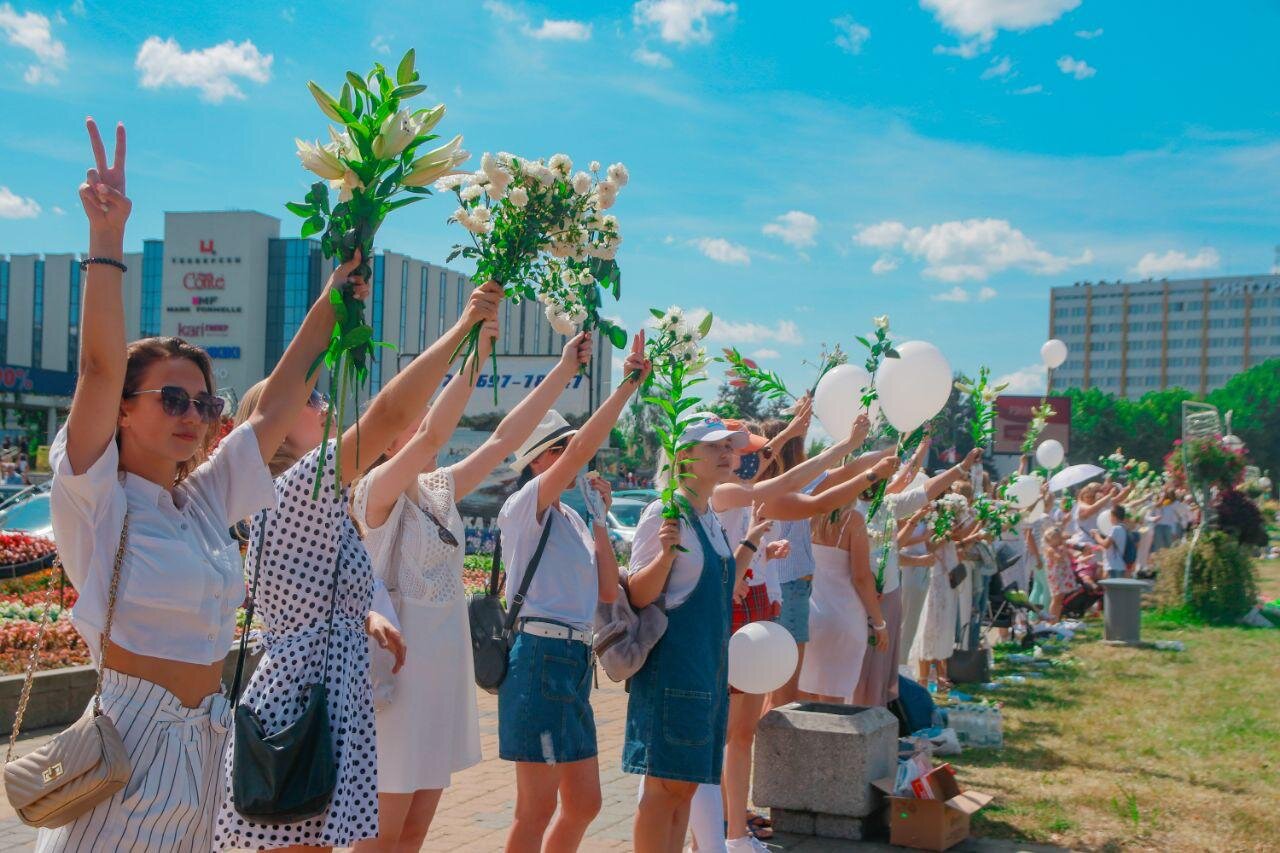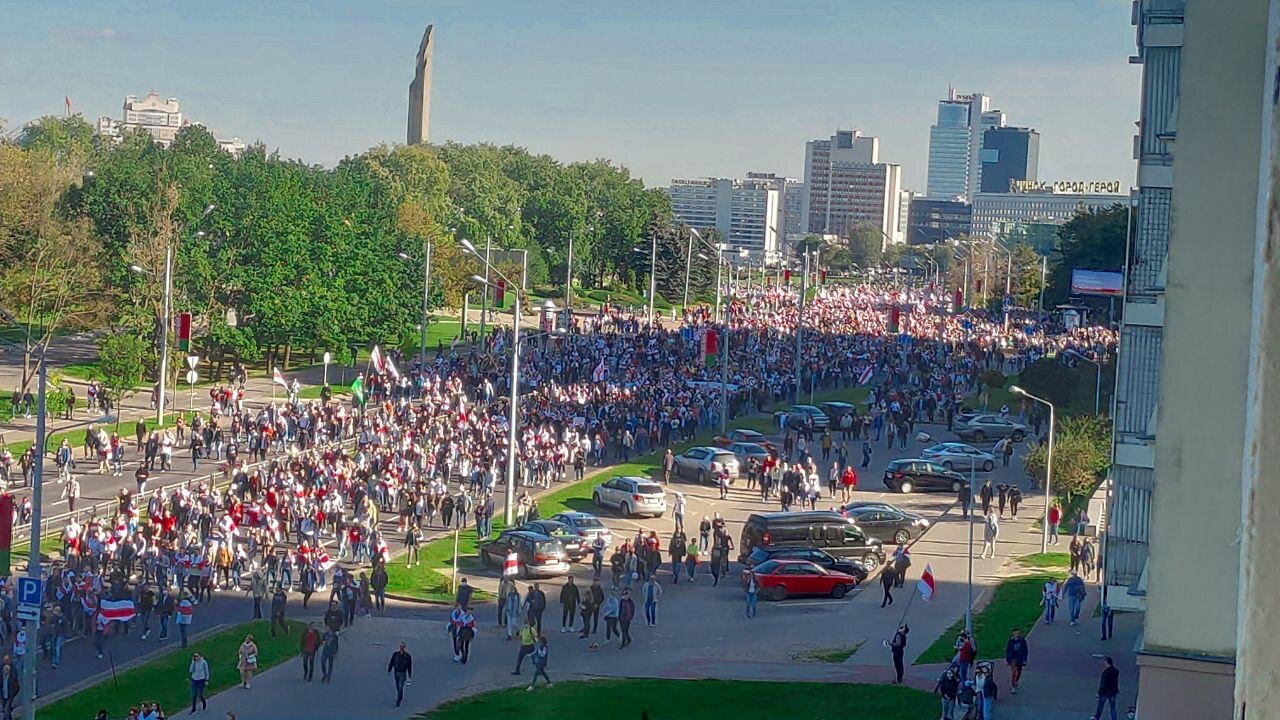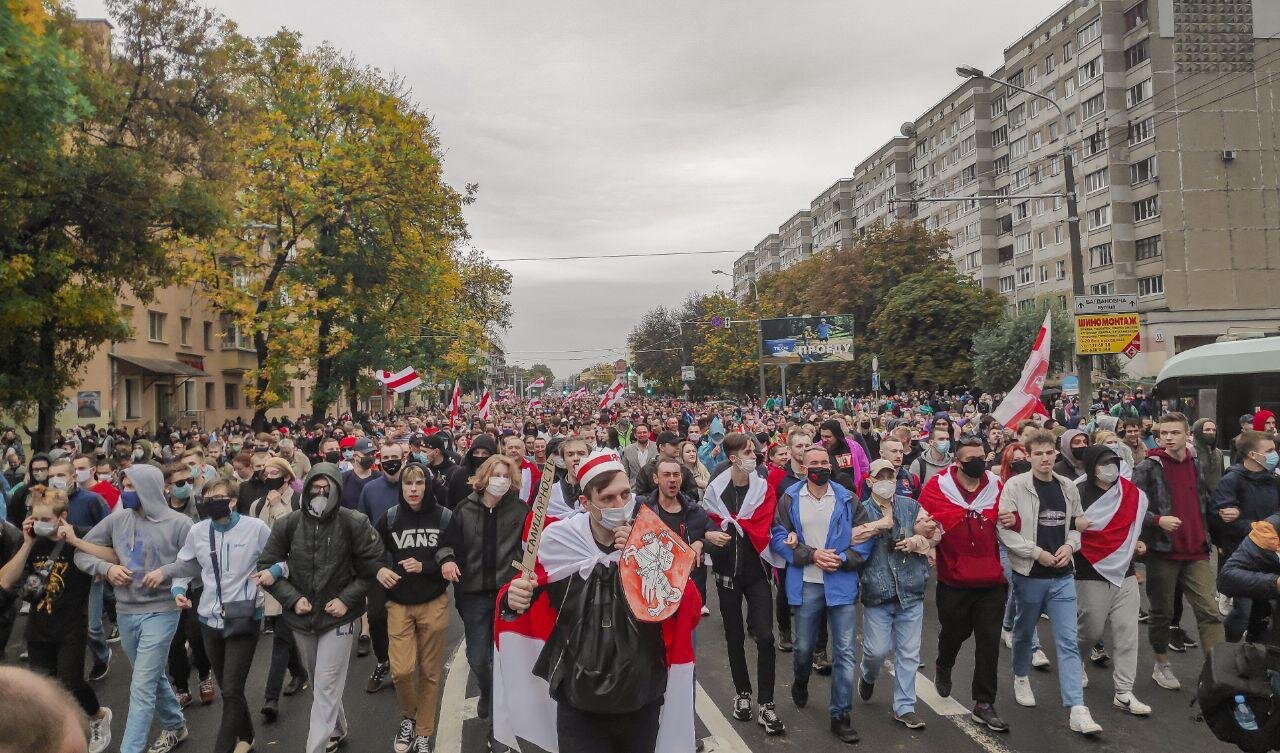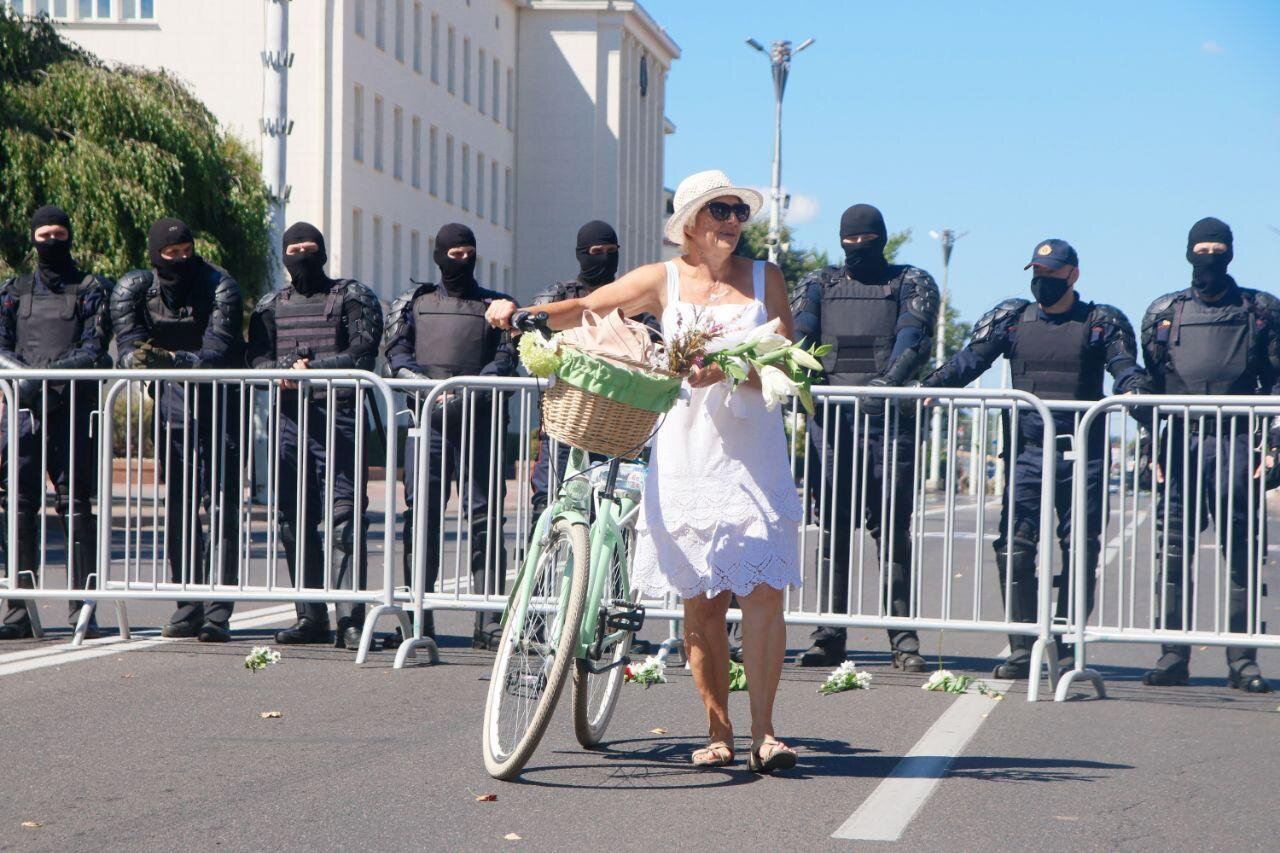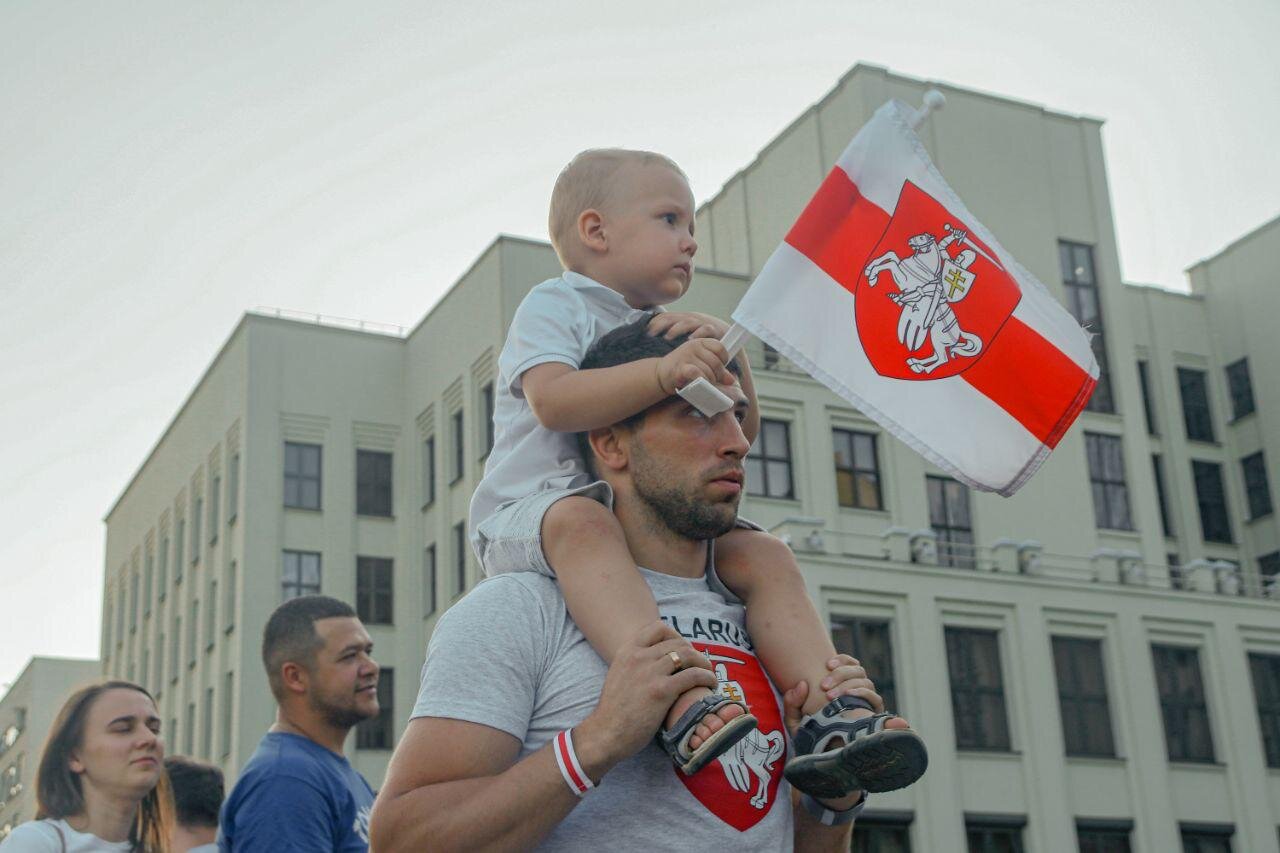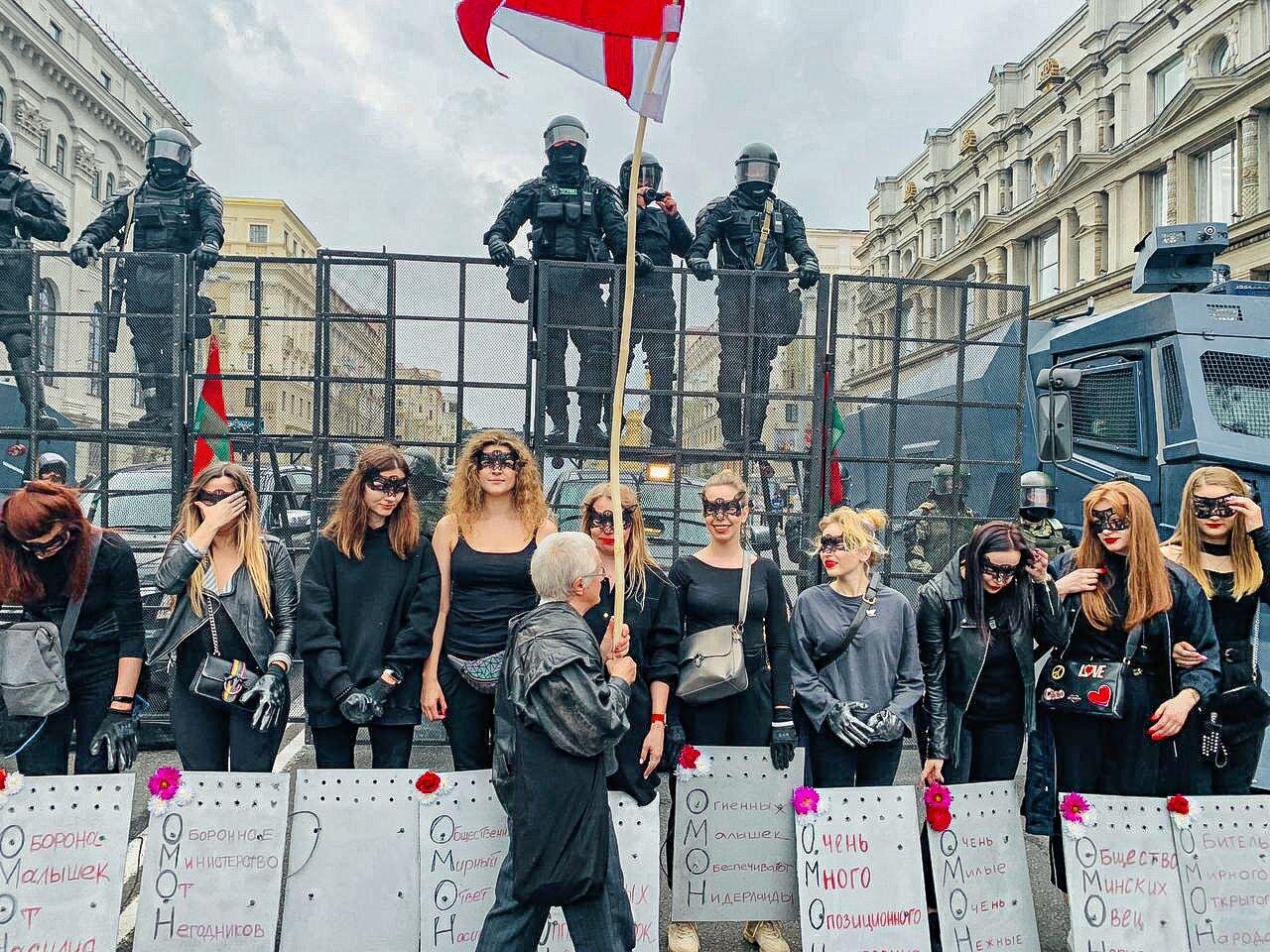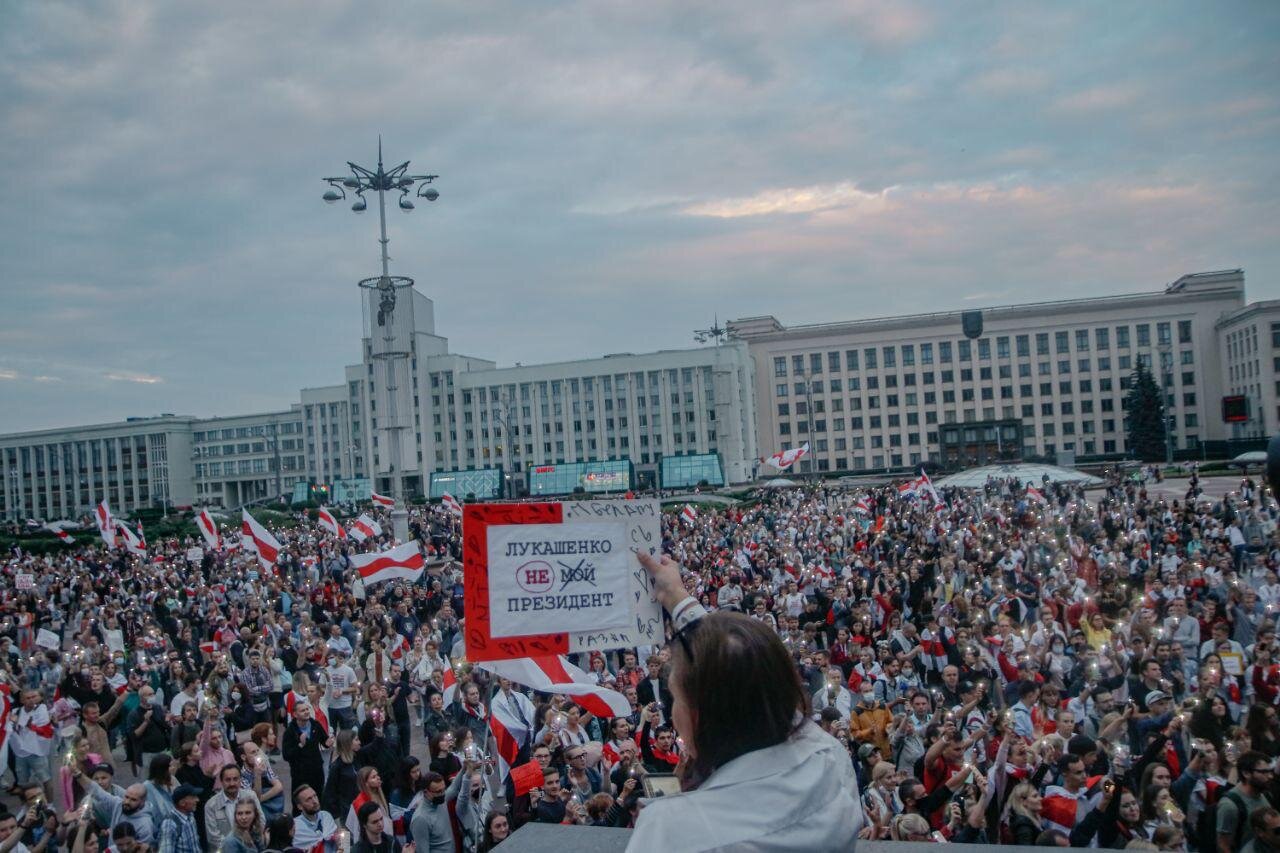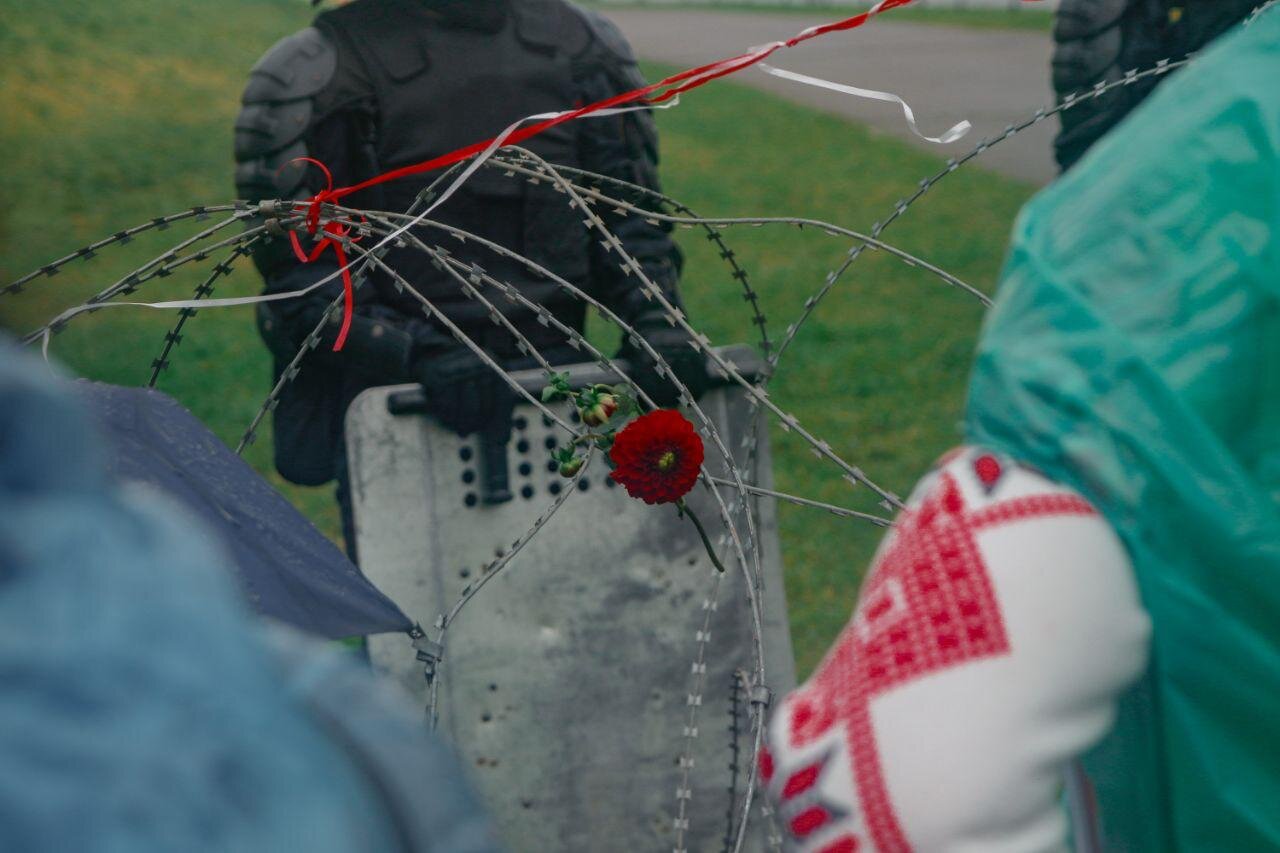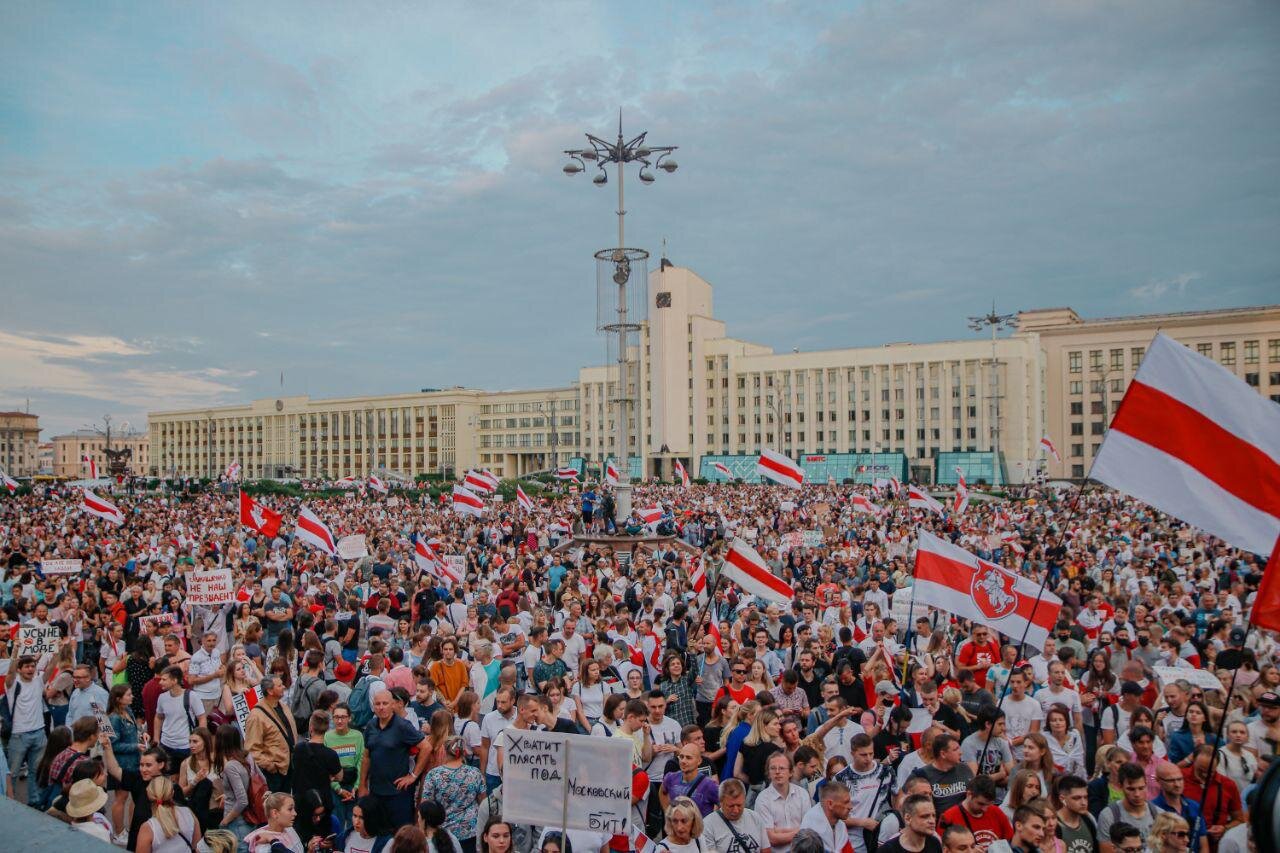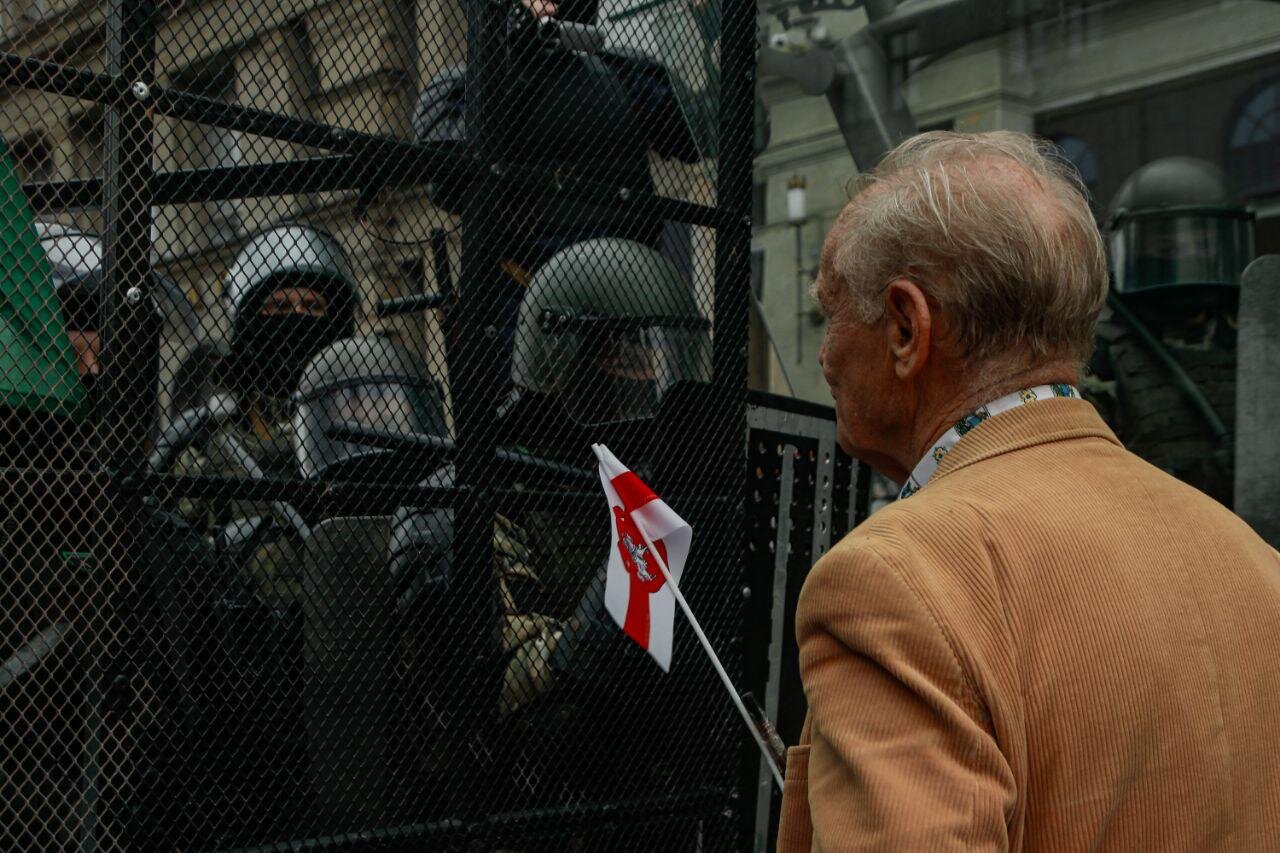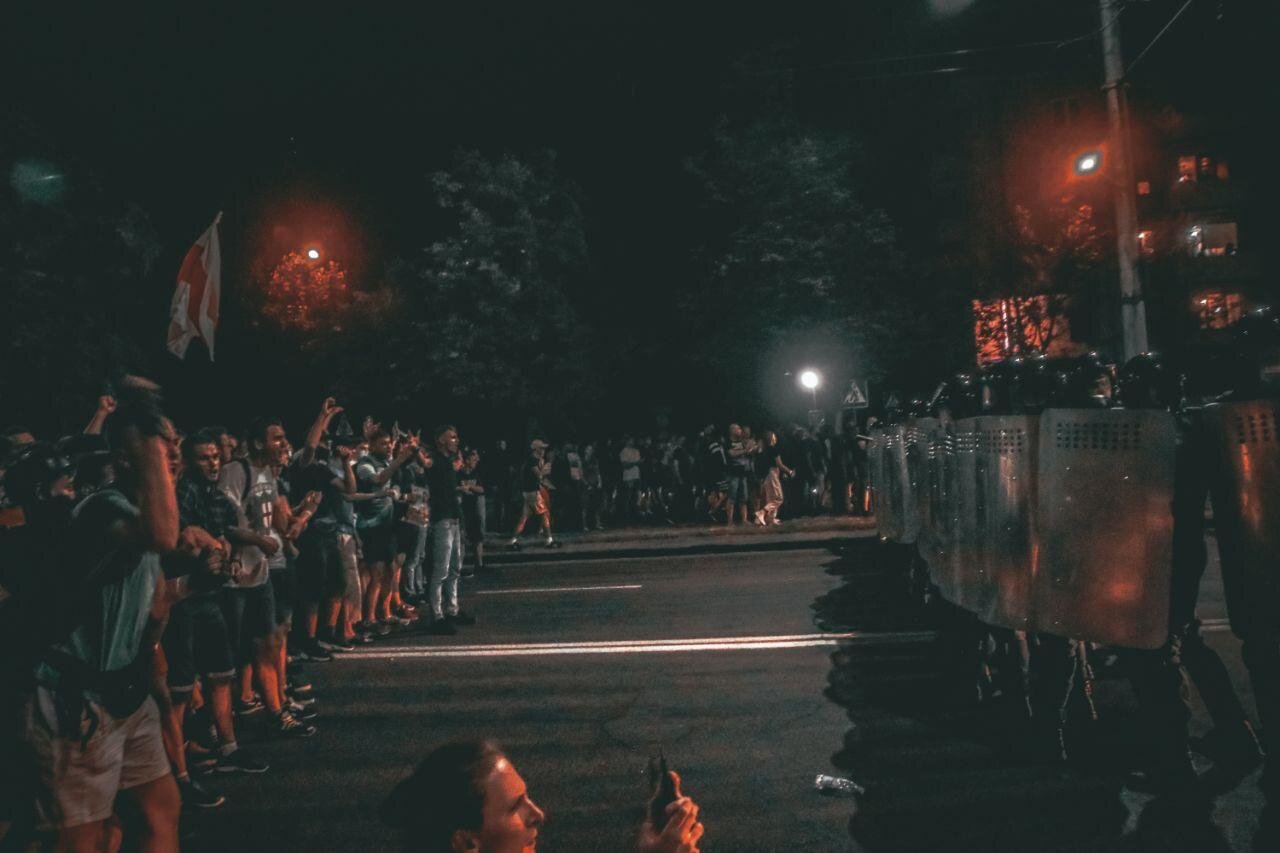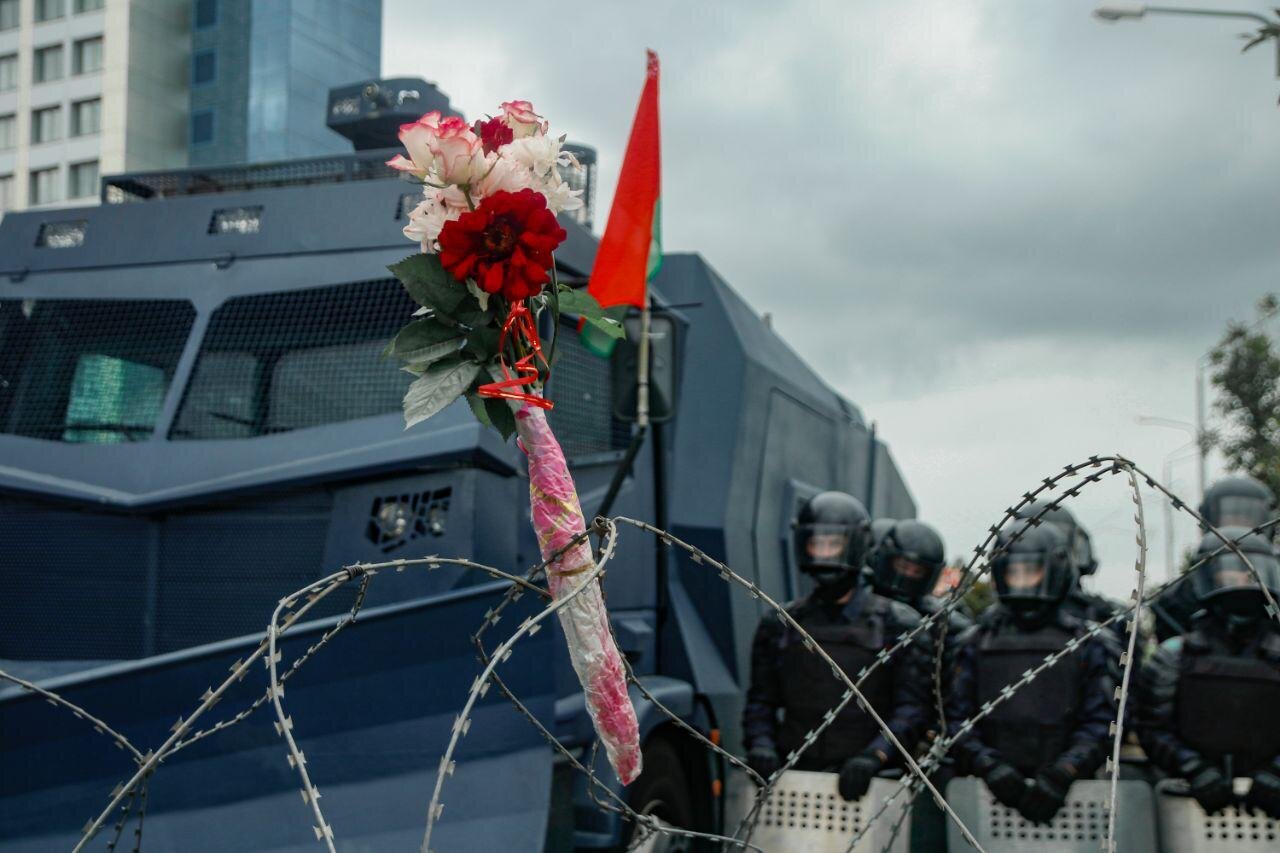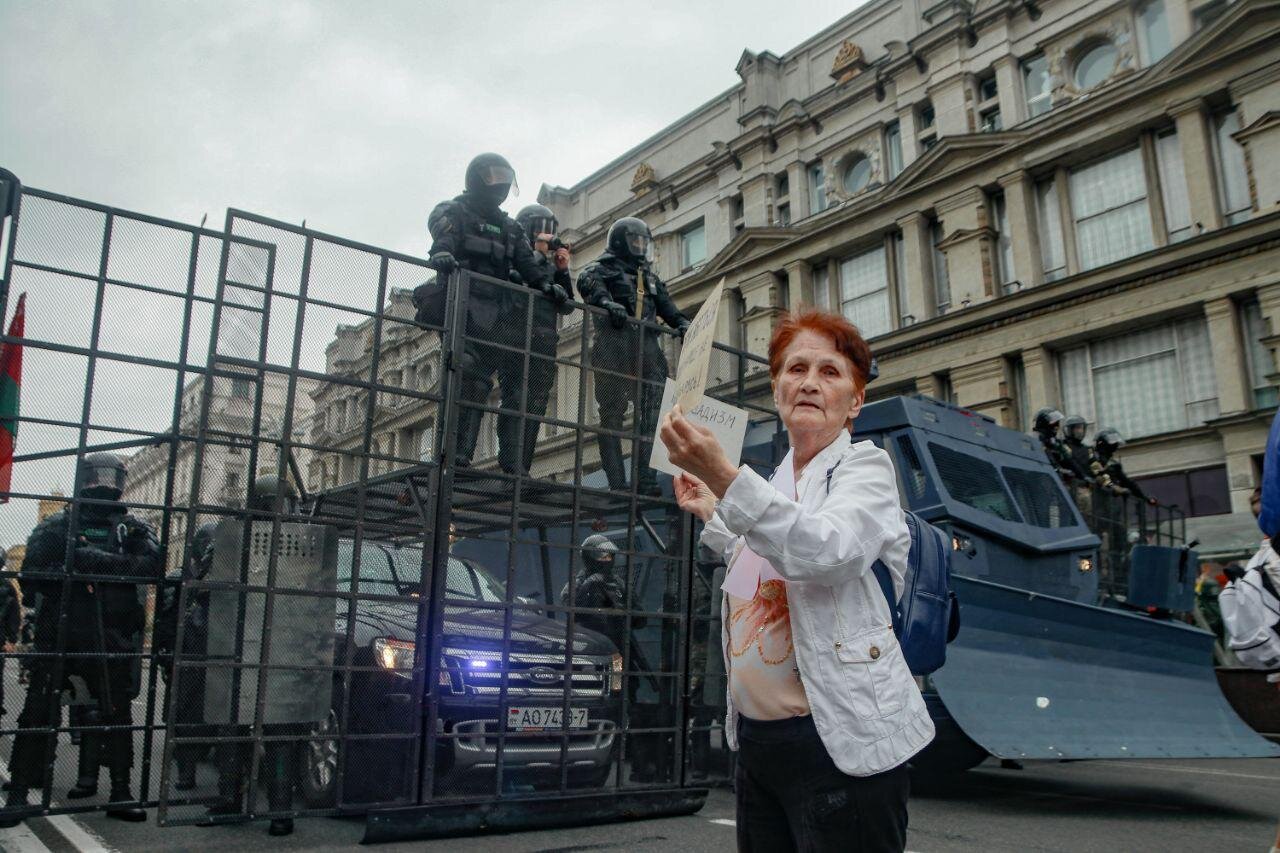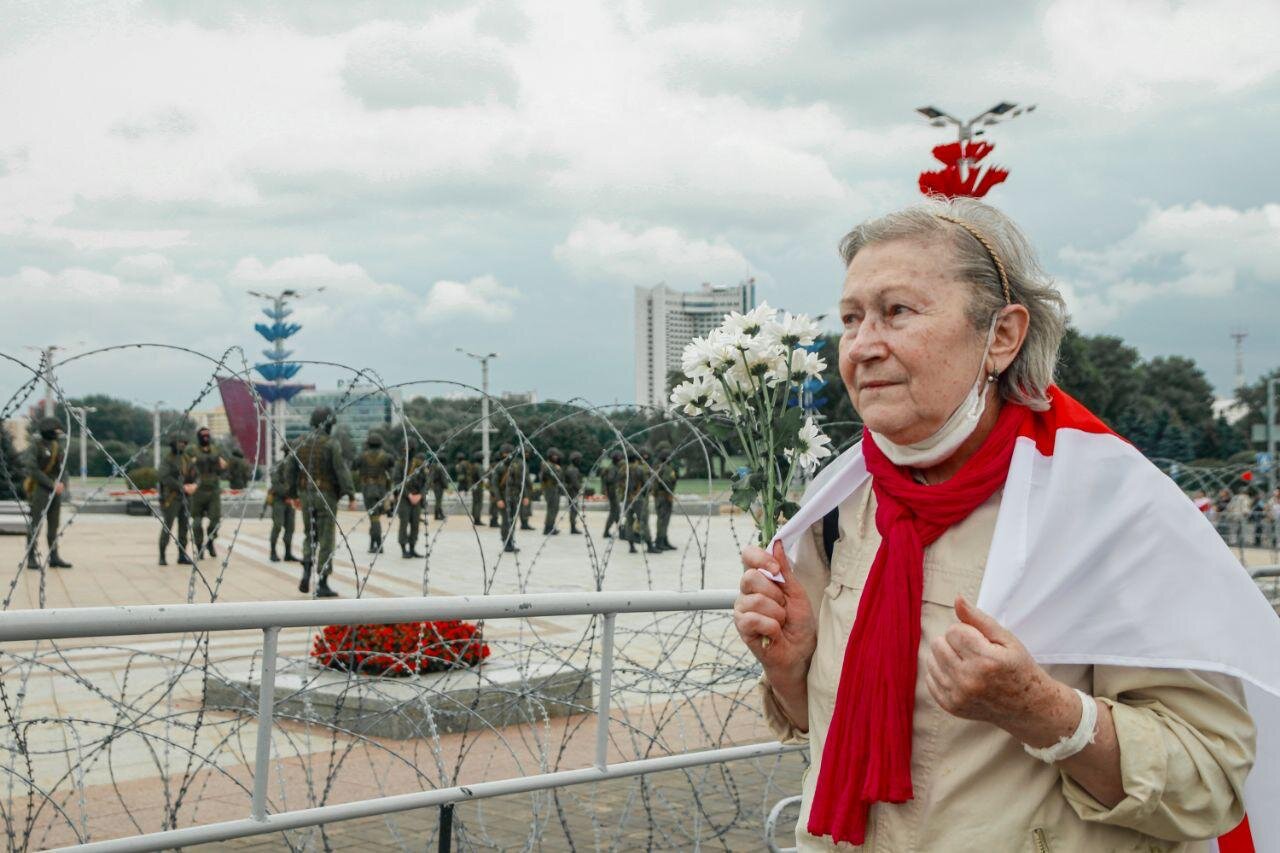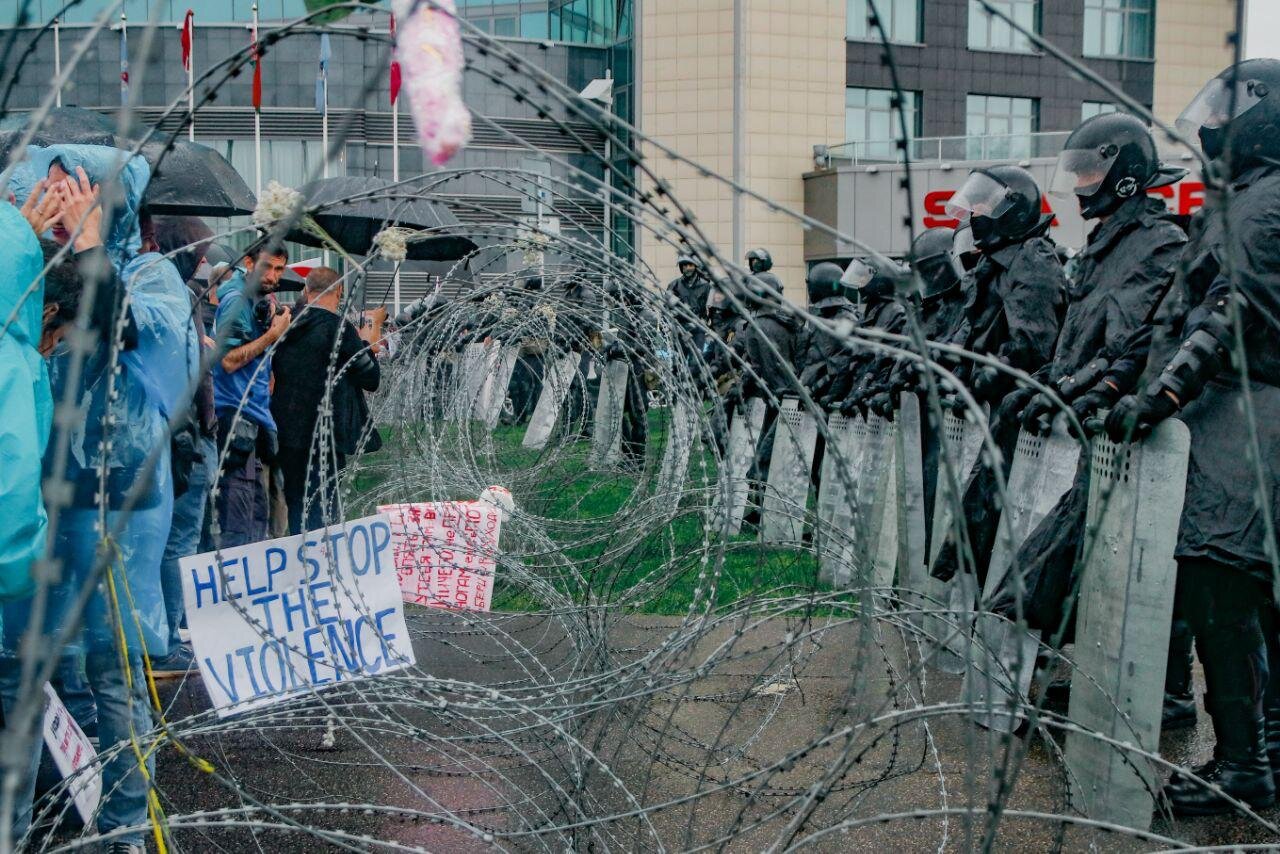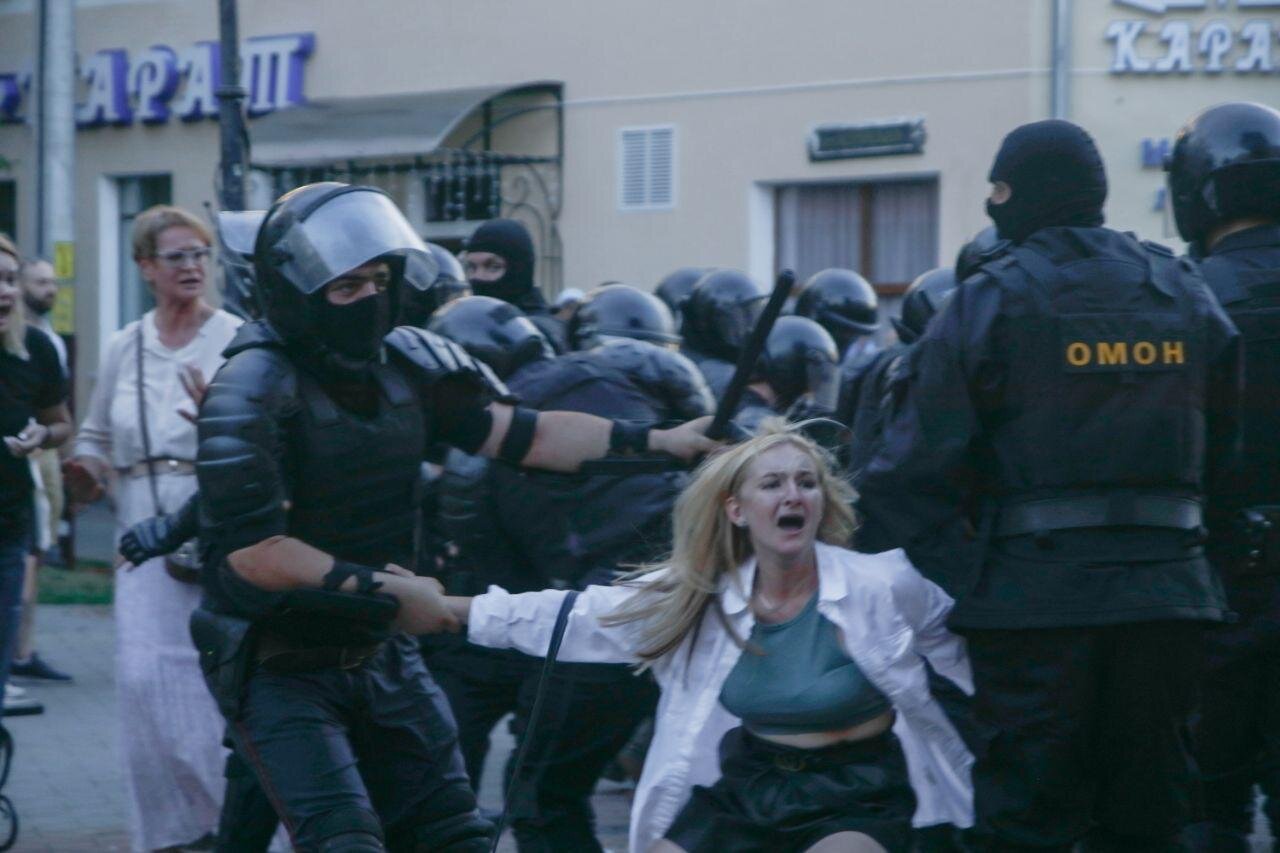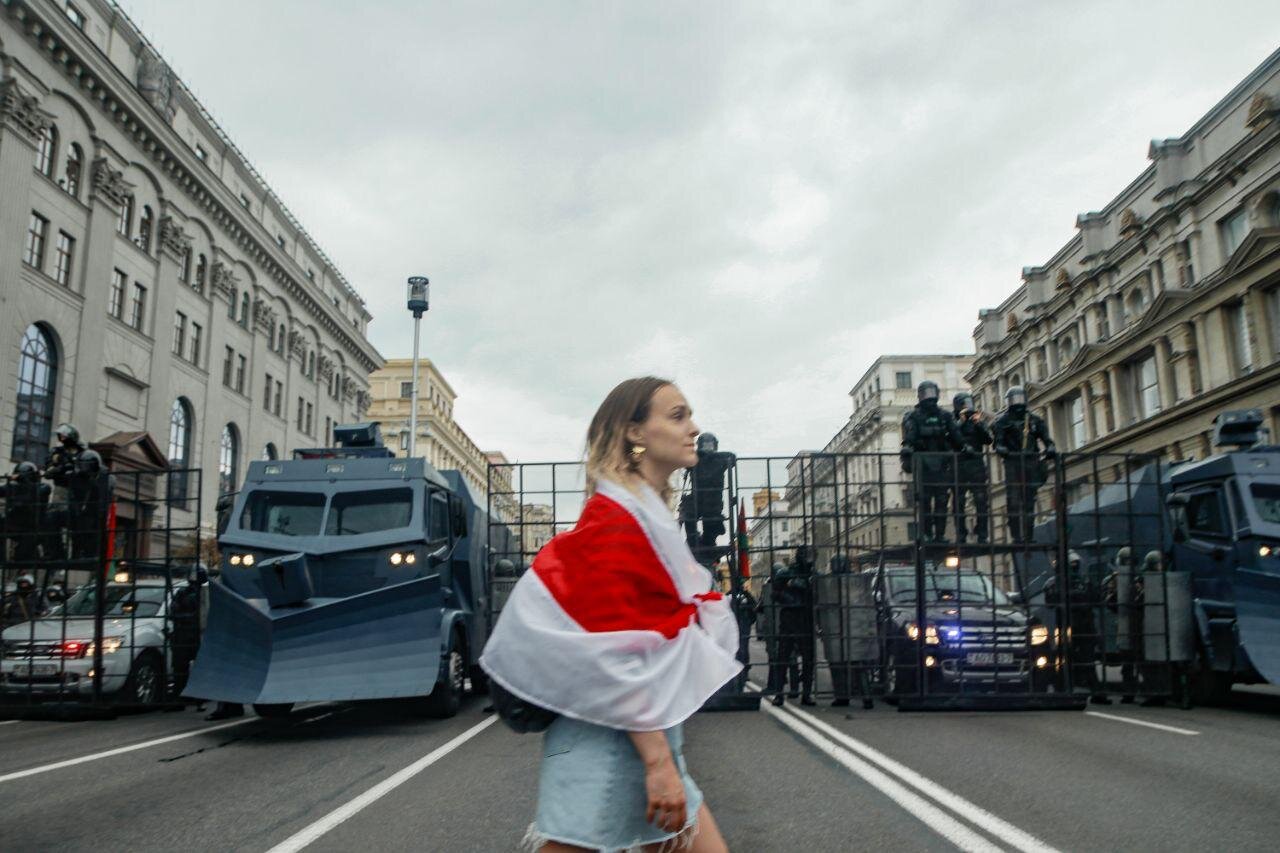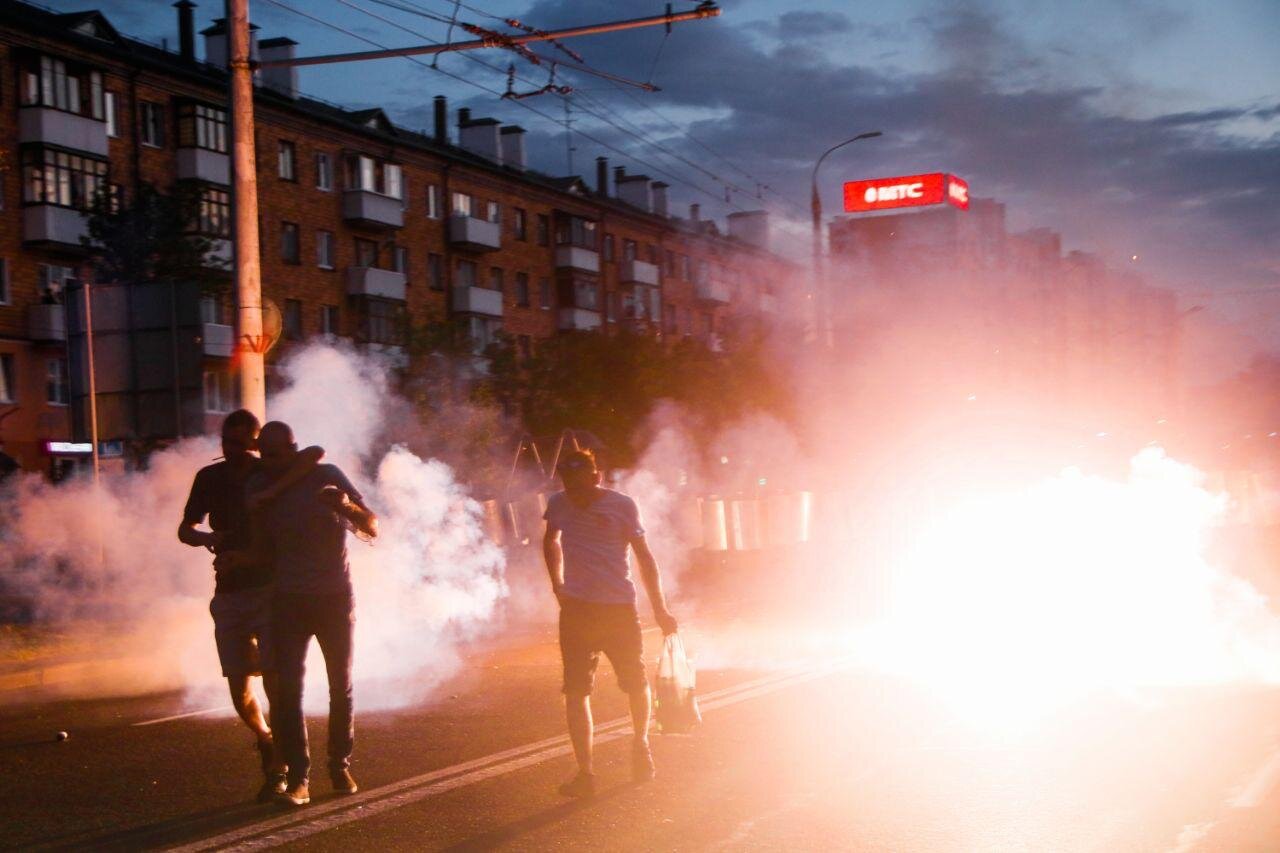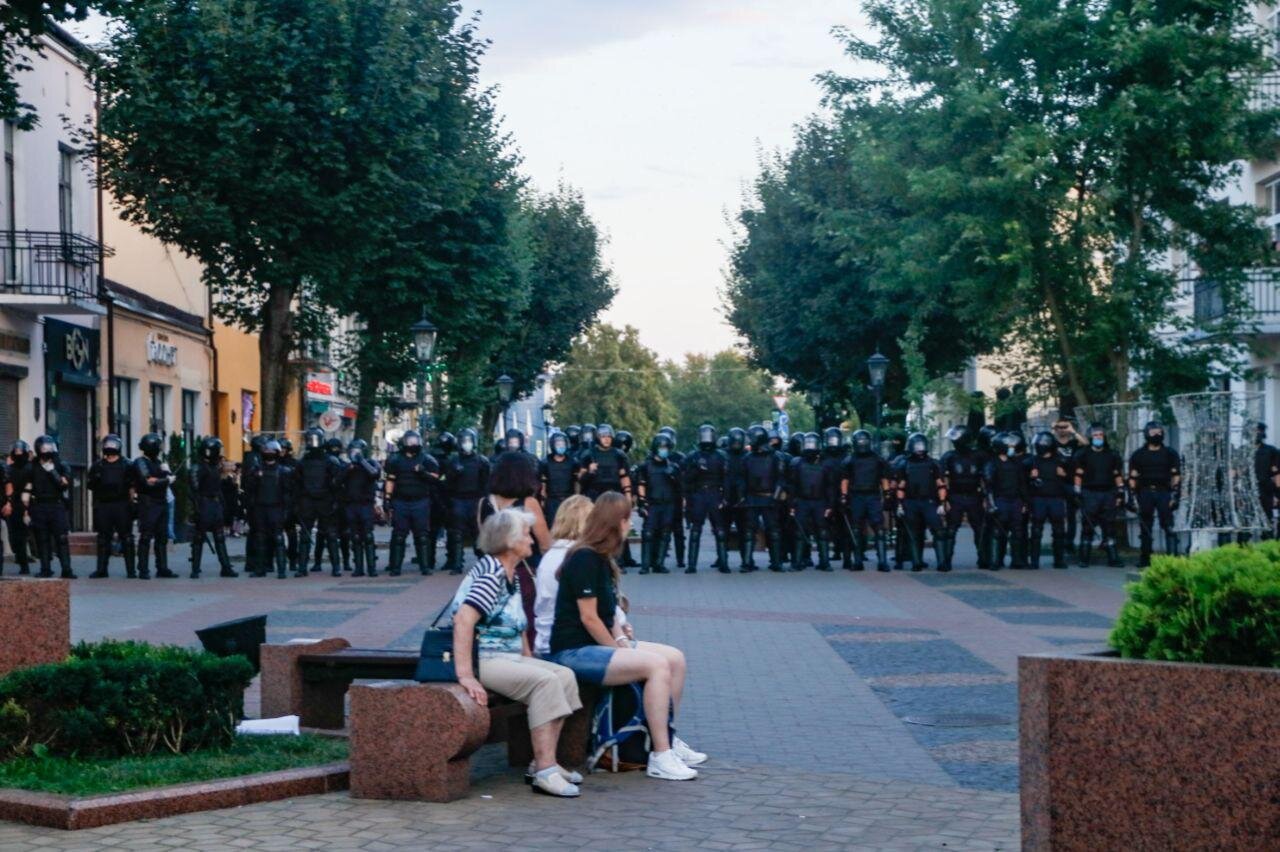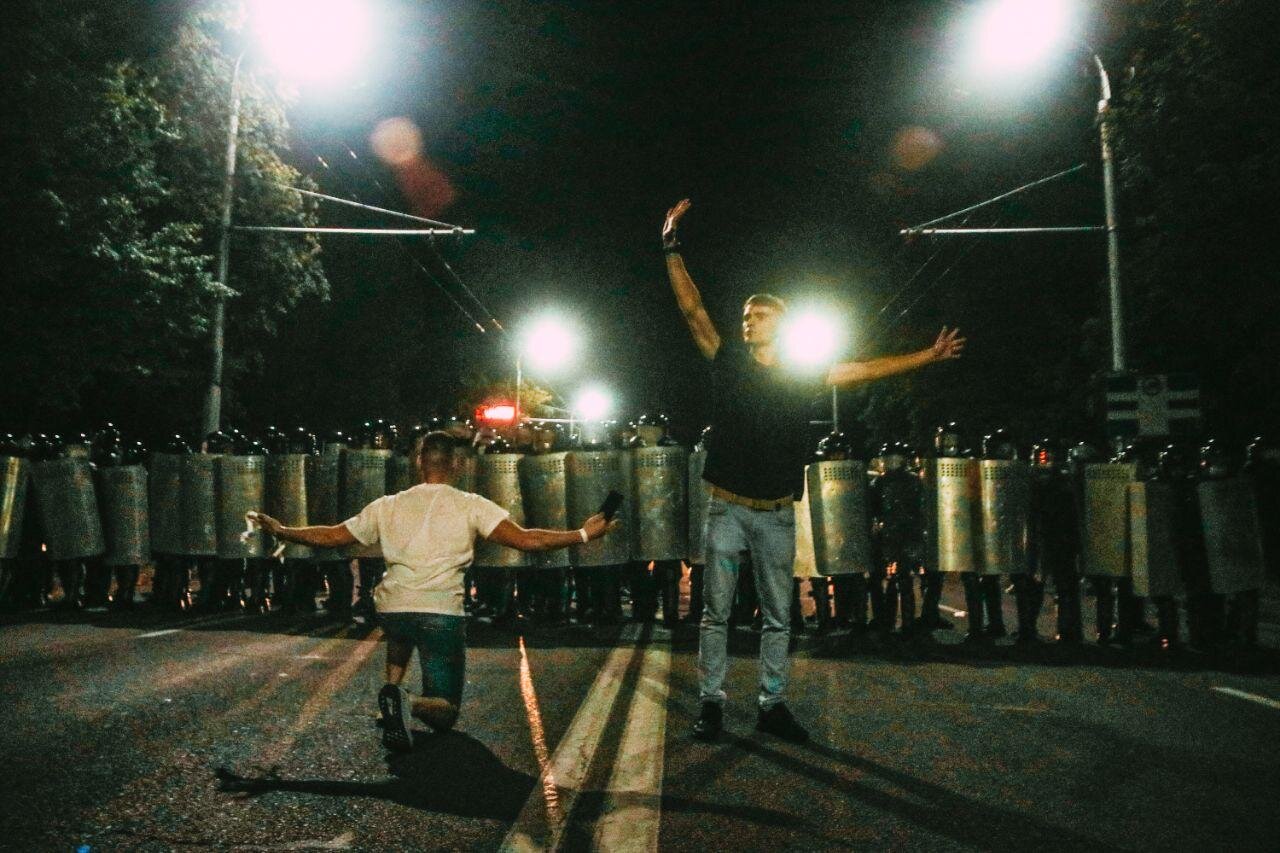“We are obliged to build a New Belarus!”: Reports from Belarusian exiles in Poland
Photos from TUT.by
For over 80 days, Belarusians have physically challenged Lukashenko's regime of over a quarter century. The August 2020 elections, which claimed to result in 80% support of the long-standing president, is widely believed to be fraudulent, leading to massive peaceful protests and “brutal police crackdown[s]" (NPR). Only a Western perspective would frame his presidency as “The Last European Dictatorship". It implies that a movement towards Western ways is a movement towards development. But there is no need to suffocate Belarus between the dichotomous forces of East and West in order to support or learn from their struggle against authoritarianism. ‘Democracy' is not the only thing Belarusians are fighting for, there is also a strong desire to rescue what has been lost as a result of the power struggle between these two worlds — to preserve a unique language, culture, and home.
The sanatorium in Duszniki-Zdroj.
Dissident thought is the undercurrent of what the Belarusian government seeks to criminalize. Writer and former presidential candidate Uladzimir Nyaklyaeu explains that “Russification during the Lukashenko years has been twice as intense as it was during the Soviet years" (Radio Free Europe). Resisting his tight grip on power is in large part related to the rescuing of not only an endangered language, but also of its rich literature and culture. Even elderly people join the protests (Radio Free Europe) while the youth finds creative ways to keep the language and other native practices alive, revealing the scope of the resistance movement.
“Now it's a big mix — women, disabled people, men and young people are going out to protest peacefully" (Inna Shulga, Belarusian activist).
During the first days of protest, between August 9th and 11th, there were over 7 thousand arrests across the country (Belsat.eu). A month later, the reported number had doubled, as well as a list of over 100 political prisoners, not to mention Secret Service raids against journalists and internet shutdowns (Euronews). Those avoiding arrest have had to flee the country, often injured and without documents. Poland, a long-term backer of Belarusian independent media (BBC), is in support of the opposition and welcomes the exiles.
Today, a sanatorium in Duszniki-Zdroj, about 200 miles west of Kraków, treats 20 Belarusian exiles; 15 men and 5 women. They escaped to Poland to access medical care and avoid arrest. In Belarus, they are wanted by the police for their participation in the riots, which led the government to freeze their bank accounts and surveil hospitals.
These exiles find themselves in an administrative limbo, as neither refugees nor deportees. Polish authorities have provided the possibility for refugee status, which grants about 200 euros a month (Asylum in Europe) but no possibility to return home. Many have crossed the border without documents, do not speak Polish, and most importantly, have not given up on the struggle. Their courage to continue the fight to liberate their homeland from the tight grip of a fraudulent regime is as unique and powerful as the identity they fight to protect from imperialist forces.
Inna Shulga, a Belarusian activist, collected and translated reports from a few exiles in Duszniki-Zdroj, the Polish town bordering Czech Republic mentioned above, describing their fight against the brutal repression of the Belarusian government. Most need to remain anonymous, but Aliaksei Batsianouski, Dmitri Kudzielevich, and Aliaksandr Kanetski were willing to tell their story in detail, and shared images of themselves and their injuries.
Aliaksei Batsianouski
Aliaksei Batsianouski, one of the Belarusian exiles in Duszniki-Zdroj, describes how he was beaten unconscious before escaping to Poland:
After the presidential elections in Belarus, I got injured August 10, 2020, returning home after evening work. I was crossing the intersection of one of the streets in Minsk. I unexpectedly got beaten with batons and was persecuted by officers of the Department of Internal Affairs. Ununiformed people in black masks with firearms and batons ran up to the car and started beating me. I was very scared for my life and started to run. They began to chase me by car, and later they pushed me to the side of the road for a collision with a ram, where I crashed into a concrete block. Then they ran up, took me out of the car and severely beat me until I lost consciousness.
The police officers accused, and still accuse, me of participating in illegal rallies and coordinating protests. With serious injuries and unconscious, I was taken to the emergency room. I got a diagnosis — traumatic brain injury, contusion of the heart and internal organs, legs, severe contusion of the arm and hand, fracture of the phalanx of the left finger. While in the hospital, on the recommendation of a lawyer, an application was filed against the employees of the department of internal affairs for causing grievous bodily harm and I attached all evidence. After that, the persecution by the government started. In this regard, not having time to be treated, I was forced to leave the city, and after, to leave my country, the Republic of Belarus.
At the moment, I am still in a rehabilitation center and my left hand does not work yet. In Belarus, I left my loving wife and a half year old child, who are unable to leave the country now… They are left there alone and being intimidated by special forces because of my accident, because I was at the wrong place at the wrong time. Until now, my car is being illegally held, cases with gross violations of the law from my side have been fabricated and heavy fines have been imposed, my accounts are blocked, and my business has been paralyzed.
Not a single criminal case has been initiated on the fact of violence against ordinary citizens who have nothing to do with the rallies and protests. To justify the harsh actions of the security forces, criminal cases are fabricated against the injured civilians. The decisions of the Belarusian court are not legal.
I am very sorry that I cannot return to Belarus yet, as I fear for my health and freedom. Moreover, I have no opportunity to help my family, develop a business, continue my education in Belarus. In Poland, I am on the basis of a humanitarian visa, which currently does not offer employment opportunities. I really hope that in the near future the situation will change, I will be able to improve the standard of living of my family, promote democratic development; the common good between the peoples of Poland and Belarus.
Dmitri Kudzielevich
Dmitri Kudzielevich, a mine worker and labor rights organizer, reports on being accosted by the Belarusian KGB after igniting a strike at a fertilizer processing factory in Soligorsk, about 80 miles south of Minsk:
A fire raged in my soul for over twenty years. While working as a mining engineer, in communication with miners, I regularly touched upon the topics of injustice, the plight of the working people and the reasons that gave rise to this darkness. And since fall of last year, the mood of the workers has noticeably intensified. On August 9th, the people made their choice, and presidential elections were held. In the evening of that day, numerous facts of outright falsifications became clear. This became the reason for the emergence of the national all-Belarusian protest.
People returned with families, companies and alone to their polling stations demanding justice. The authorities released the brutal riot police, army, and militia to disperse the numerous rallies that had risen. Belarus has not seen cruelty and atrocities of this magnitude since the Second World War. Civilians were severely beaten, raped, and killed by the security forces. However, this did not break the will of the people, but just the opposite, caused a general upsurge.
Women took to the streets and confronted the security forces with a united front.
In Soligorsk, many residents also suffered, many of whom turned out to be children, brothers, sisters, and wives of miners. As well as the miners themselves. September 14th, employees of JSC “Belaruskali” together with other residents of Soligorsk gathered in a crowd of thousands in front of the head office of “Belaruskali”. I saw how people rushed to the meeting place, fearing to be late...
“Cancellation of the results of falsified elections", “Ending violence against people", “Release of all political prisoners and a fair investigation!"
The street protests continued.
At the same time, we were preparing for a strike. On Monday morning, September 17th, I arrived at work. People did not go to workplaces but crowded around the building of the mine administration. I felt disorganized, tense, and nervous. Some stood in the open air, emotionally interrupting those who declared something indistinct from the steps of the entrance to the administration building. And then I realized — It’s either now, or never.
My sudden and loud public speech had the effect of a bomb explosion among the leaders of the enterprise who were right there. I became one of the first engineers to call miners to strike in outright disobedience. The people were inspired. They chose a strike committee, developed a plan to shut down the mine and the processing plant. There was a proposal to record our decisions, to take responsibility for them in writing. Of the 3.5 thousand employees of the 4th mining department, almost 2 thousand people signed in the Consent Lists in two days. And this happened at all six mines of BELARUSKALIY OJSC in Soligorsk. The strike committees decided to take people out of the enterprises and gather in the main square of the city so that ordinary residents of Soligorsk could join the protest.
Perhaps this untimely decision was a failure. Having no experience in organizing strikes, we made a number of serious mistakes. Some of the people who did not find the spirit to leave the enterprise were forced to work, to take measures to maintain the efficiency of the enterprise. Protesters on the square from afar saw how at that time the pipes of fertilizer processing factories were still working... This circumstance, as well as powerful disinformation and denials of the authorities and the administration, gradually brought doubts and split in the ranks of the protesters. At the same time, the arrests began.
One day I received a call on my phone with a request to meet with like-minded people looking for answers to questions. It was in a prearranged place, and the unexpected meeting took me by surprise. They were KGB officers. At the time of the attack, I managed to inform one of my like-minded people, on the switched-on phone, that I was being detained by unknown people. As a result of a short struggle, they pulled me out of their car, dropping the keys to the car from my hands into the roadside grass. During a personal search, they seized my phone and, by mistake, the keys to the second family car, which is driven mainly by my wife, and without a distinctive sign on the keychain.
In the district office of the Belarusian KGB
I was politely offered a glass of water and insistently asked to tell about the “source of financing of the strike", and they also demanded I give information about the place where the lists of supporting workers were kept. I drank the water but did not tell them anything. They did not understand the obvious — that people took to the streets not for money, but for a high idea! They also did not understand that the lists were needed not only to count the participants but also to help simple workers to overcome a psychological barrier, their fears. When someone is declaring their socio-political position, this person is committing a complete, life-affirming act.
At some point, when one agent remained with me in the office, I persuaded him to take me to the toilet. I had no plan at that time. Everything happened impromptu. While I was relieving myself, I noticed that some construction was underway in the room, repair work — buckets of cement were on the trestles, shovels and tools were near the walls. And the grating on the window leading to the service area was unlocked... But the window was unusual, opaque, consisting of thick-walled glass blocks, except for four that were missing, where a window was mounted.
To be honest, I thought not for long. Every noise, crackle of the grille, which now played only the role of a footrest or a comfortable support for my hand, sounded treacherous in my head as a deafening ringing. Falling with one foot on the tin windowsill with a crash, I jumped onto someone's car parked under the windows in the service yard. I ran — along the asphalt, through the gates, and into the adjoining courtyard of the city hospital. I ran into the forest; it was close. And there I thought that there is a possibility that my car could have been thrown there. They did not bring it to the KGB yard with me. Through the forest I ran to that place, found my car, easily found the keys, sat in, and drove outside the city along the nearest road.
I made a decision quickly — leave the borders of the Republic of Belarus. There is no border movement with Poland due to COVID-19, so I went to Ukraine, where I crossed the border without a problem. In Ukraine, I turned to the Polish consulate. Having received a humanitarian visa, I crossed the border and moved to Warsaw. Upon arrival, I turned to our Belarusian House.
My fight is not over
My family stayed in Belarus. They are in potential danger. I am very worried about them. Keeping in touch with them, I listen to every sound on the phone. At home I have a wife and two small children. Continuing my resistance, from my place, instructing the miners and creating joint projects, actions, I put my family at direct risk.
Today, the main task is to consolidate around a single idea! We are obliged to build a New Belarus! But first of all, we ourselves must be ready to live in a new way. The revolution must take place in our minds.
Aliaksandr Kanetski
Aliaksandr Kanetski, 30, shares his experience after voting for Sviatlana Tikhanouskaya and attending a protest in Minsk. One can only imagine the pain he must have endured from his injury, all the while receiving treatment under police custody.
The rubber bullet that was removed from Kanetski’s foot.
On August 9th during the elections of the President of the Republic of Belarus, I voted for Sviatlana Tikhanouskaya. There had been an unprecedented rallying of Belarusians for this candidate during several pre-election months. People finally saw how many of them were dissatisfied with Lukashenko’s government. There were no high hopes for fair elections, but everyone wanted to show that they would no longer endure this unfairness and constant lies.
As polling stations were closing, the protocols started showing up stating the results with a huge margin in favor of Lukashenko. This fact angered people. I went with my girlfriend and group of friends to the city center to join the protests of those people who disagreed with the rigged elections. Even near our house on Pushkinskaya street, there were many people, driving and walking to the city center. Thousands of people were heading from everywhere towards the Minsk Hero City Obelisk.
The avenue was blocked by the security forces. There was a great distance between them and the people, everyone applauded and chanted: “The police are with the people!" Several times, people parted and allowed ambulances to pass. Stun grenades exploded from time to time, people were retreating a few meters, but then again moved forward. But soon the grenades began to explode closer and closer, people began to run away. The majority went to Independence Avenue. But the road there was blocked. At some point, the road back was also blocked by the security forces and people found themselves in a trap. Again, grenades flew, and tear gas was fired. People scattered.
Several of my friends and I ran away from the security forces but were surrounded. There were about 15 of us, sitting on the porch of some building and awaiting arrest. A few seconds before the arrival of the security forces, I heard an explosion and felt sharp pain in my leg. All the guys were grabbed and thrown into a police wagon. I managed to see that my girlfriend was released.
We were being taken somewhere. The detainees noticed that I was bleeding heavily, and they used a phone light to see what was going on: there was a deep wound in my foot. They brought us to the Akrestin prison. I hopped to the wall along which the detainees stood. Then the policemen took me aside and called for a doctor. The doctor removed a rubber bullet from my foot, bandaged my leg and called for an ambulance. In the morning, I was brought to a military hospital in Minsk, where a bone fracture was revealed, and the next day I had an operation on my foot.
During the first two days of protests, 60 people were admitted to the hospital with gunshot wounds. My roommates were a guy with a сrushed heel and a man with five bullet wounds.
On the fifth day, a cast was put on my leg and I was discharged. On the same day, under pressure from the public, my friends were also released from prison. They told a lot of horrifying stories about their experience at Akrestsin Street. For two weeks, I was using crutches to get to the doctor's examinations and forensic examinations. Soon, I accepted an offer from the Belarusian House in Warsaw to leave for Poland for treatment and rehabilitation, as I feared criminal prosecution.
At the moment, not a single criminal case has been filed on the fact of violence against protesters. On the contrary, in order to justify the harsh actions of the power structures, criminal cases against the victims have been fabricated. The decisions of the Belarusian court are neither independent nor fair.
I am currently undergoing a rehabilitation course in Poland. Unfortunately, I am not yet able to return to Belarus, as I fear for my health and freedom. With the invaluable support of local Belarusian volunteers, I hope to get the opportunity to work and study here.
In spite of everything, I am very proud of Belarusians. And I believe that soon we ourselves will be able to build the future of our Motherland, together.
Inna Shulga, an activist born in a small town near Chernobyl in 1991, is now an economist living in Poland. She has taken the initiative to raise funds for Belarusian exiles by organizing auctions. At first, moved by profound concern and heartbreak, Inna auctioned off some of her own possessions (shoes, bags, homemade alcohol, etc.) to send the money to people in need back home. But the initiative grew, more people started offering things to be auctioned, and she noticed there were people in need crossing the border towards the area where she currently lives.
Last week, the humanitarian visa that enables these exiles to stay in Poland without refugee status (Notes From Poland) will also allow for work. However, many are severely injured and do not speak Polish. Inna's auction initiative guarantees they will have a place to live and other necessities met in the meantime.
“If every person thinks about something helpful they can do for others, we will have so many good things around. It doesn't have to be financial help — just simple things.”
Faith in the democratic system is eroding not only in Belarus, but also in the United States and other places around the globe. The principles of ‘Freedom' America sought to defend for almost a century revealed to be a shortcoming in their own territory, and not exclusive to 2nd and 3rd world authoritarian governments.
In Brazil, democracy did not bring freedom, equality or peace. Our country has a cruel government — no more, no less cruel than Belarus, just different. In recognizing our differences, we can also see our similarities — our struggle against the State, and its apparatus of repression, fear and misery inflicted upon the bodies of dissidents.
Barriers between East/West, developed/underdeveloped, 1st/2nd worlds are dismantling, though some politicians still try to keep them alive in the imaginary of the US population. In reality, there has always been only one world. Today, those who used to be seen as threats or victims may in fact be the greatest inspiration for anyone seeking to uphold Democratic values in their homeland.

